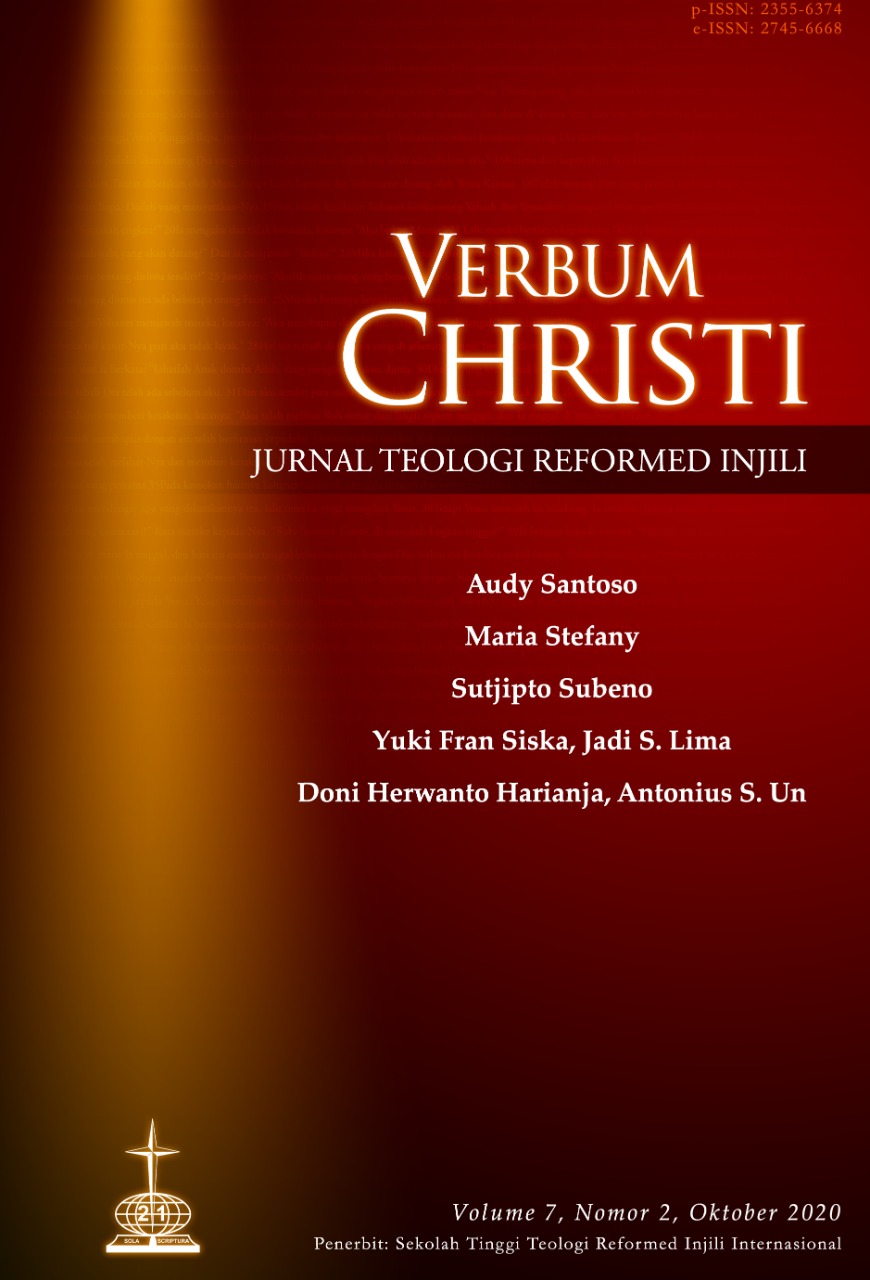Teologi Salib dalam St. John Passion
Kristus Dimuliakan Melalui PenderitaanNya
DOI:
https://doi.org/10.51688/vc7.2.2020.art2Kata Kunci:
Kristus , Bach, Musik, Yohanes, passion, Luther, teologi, salib, penderitaan, kemuliaan\Abstrak
Di dalam artikel ini, penulis memberi pendahuluan mengenai pentingnya karya musik yang agung bagi iman Kristen; dimana musik dan teologi dapat saling berintegrasi, dan musik dapat menjadi sarana untuk mengartikulasikan teologi. Namun, penulis menunjukkan adanya gap antara tulisan-tulisan dari para musikolog dan teolog dengan kehidupan orang Kristen saat ini. Dalam penelitian ini, penulis berfokus pada St. John Passion karya Bach—dimana sebenarnya banyak orang Kristen dapat menikmati karya musiknya, tetapi pemahaman mereka terhadap karya ini masih sangat terbatas. Pada bagian pembahasan, penulis menjelaskan karya St. John Passion berdasarkan pandangan Johannine dan theology of the cross yang terkandung di dalamnya; serta menjawab pertanyaan: (1) Bagaimana melalui karya musik yang agung, theology of the cross—Kristus dipermuliakan melalui penderitaan-Nya—dapat diartikulasikan? (2) Bagaimana orang Kristen dapat menaruh imannya kepada Juruselamat yang dihina, mengalami penderitaan, dan direndahkan sampai pada titik yang terendah?
Unduhan
Referensi
Arndt, Johann. Auslegung des gantzen Pssalters Davids des Königlichen Propheten. . . (Jena, 1624), fol. 42v.: “Christi Name das ist / Person / Ampt und Wolthaten sollen in aller Welt offenbahr werden.” Dikutip dari Eric Thomas Chafe. J. S. Bach's Johannine Theology: The St. John Passion and the Cantatas for Spring 1725. New York: Oxford University Press, 2014.
___________. Auslegung, fol. 46v. Dikutip dari Chafe, J. S. Bach's Johannine Theology: The St. John Passion and the Cantatas for Spring 1725, 155.
Augustine, St. The Confessions. Hendrickson Christian Classics. Peabody, Massachusettes: Hendrickson Publishers, 2004.
Calov, Abraham. Die heilige Bibel nach S. Herrn D. Martini Lutheri Deutscher Dolmetschung und Erklärung. Wittenberg, 1681-82. Dalam Michael Marissen. Lutheranism, Anti-Judaism, and Bach's St. John Passion: With an Annotated Literal Translation of the Libretto. New York: Oxford University Press, 1998.
Chafe, Eric Thomas. J. S. Bach's Johannine Theology: The St. John Passion and the Cantatas for Spring 1725. New York: Oxford University Press, 2014.
Francke, August Hermann. Oeffentliche Raden über die Paßlons-Historie / Wie dieselbe vom Evangelisten Johanne im 19. U. 19. Cap. Beschrieben ist. 1716, 2nd ed., Halle, 1719. Dikutip dari Chafe, Eric Thomas. J. S. Bach's Johannine Theology: The St. John Passion and the Cantatas for Spring 1725. New York: Oxford University Press, 2014.
Gardiner, John Eliot. Bach: Music in the Castle of Heaven. New York: Alfred A. Knopf, 2013.
Harris, Mark. “Hidden behind Its Opposite: Suffering and Hope through a Pastoral Theology of The Corss.” Touchstone, 2019.
Kim, Kieun Steve Kim. “From Picture to Sound: A Conductor’s Study Guide to The St. John Passion of Johann Sebastian Bach.” PhD diss., University of Maryland, 2018.
Kirste, Reinhard. “In der Sprache des bewegten Glaubens gesprochen. . . dessen Terminologie aus den hohen Distinktionen in die Tiefe geistlichen Erlebens hinabgeht.” Dikutip dari Andreas Loewe. Studies in the History of Christian Traditions, vol. 168, Johann Sebastian Bach's St John Passion (BWV 245): A Theological Commentary with a New Study Translation by Katherine Firth and a Foreword by N.T. Wright. Boston: Brill, 2014.
Loewe, Andreas. Studies in the History of Christian Traditions, vol. 168. Johann Sebastian Bach's St John Passion (BWV 245): A Theological Commentary with a New Study Translation by Katherine Firth and a Foreword by N.T. Wright. Boston: Brill, 2014.
Luther, Martin. “A Meditation on Christ’s Passion, 1519.” In Luther’s Works, vol. 42, Devotional Writings I, trans. Martin H. Bertram, ed. Franklin Sherman, 123-306. Philadelphia: Fortress, 1971.
____________. “Heidelberg Disputation of 1518,” in vol. 31 of Luther’s Works, ed. Harold J. Grimm and Helmut T. Lehmann. Philadelphia: Fortress, 1957.
____________. Luther’s foreword to Georg Rhau’s Symphoniae iucundae. Dikutip dari John Derksen. “’Music Is Next to Theology’ Martin Luther and Music” Touchstone, Spr 2019.
____________. “The Theology of the Cross: A Reformational Revolution.” Dikutip dari Welker, Michael. God the Revealed: Christology, trans. Douglas W. Stott. Grand Rapids, MI; Cambridge, U.K.: William B. Eerdmans Publishing Company, 2013.
____________. Weimar Ausgabe, A 1, 362; LW 31, 52. Dikutip dari Welker, Michael. God the Revealed: Christology, trans. Douglas W. Stott. Grand Rapids, MI; Cambridge, U.K.: William B. Eerdmans Publishing Company, 2013.
____________. Weimar Ausgabe, Tr 6: 348, 22-24, no. 7034: ‘Ich gebe nach der Theologie der Musica den nähesten Locum und höchste Ehre’. Dikutip dari Andreas Loewe, Studies in the History of Christian Traditions, vol. 168. Johann Sebastian Bach's St John Passion (BWV 245): A Theological Commentary with a New Study Translation by Katherine Firth and a Foreword by N.T. Wright. Boston: Brill, 2014.
Marissen, Michael. Lutheranism, Anti-Judaism, and Bach's St. John Passion: With an Annotated Literal Translation of the Libretto. New York: Oxford University Press, 1998.
Pelikan, Jaroslav. Bach Among the Theologians. Philadelphia: Fortress Press, 1986.
Rachmadi, Jethro. “The Relationship between Theology & Music dalam The Works of Jeremy Begbie.” Master’s thesis, Sekolah Tinggi Teologi Injili Internasional, 2014.
Rambach, Johann Jakob. Betrachtungen über das ganze Leiden Christi. The first two parts published in 1722, forming part of Bach’s theological library. Dikutip dari Gardiner, John Eliot. Bach: Music in the Castle of Heaven. New York: Alfred A. Knopf, 2013.
Rathey, Markus. "Johann Sebastian Bach’s St. John Passion from 1725: A Liturgical Interpretation," dalam Colloquium: Music, Worship, Arts, vol. 4, hlm. 123-39. 2007.
Stapert, Calvin. My Only Comfort: Death, Deliverance, and Discipleship in the Music of Bach. Grand Rapids, Mich.: W.B. Eerdmans, 2000.
Welker, Michael. God the Revealed: Christology, trans. Douglas W. Stott. Grand Rapids, MI; Cambridge, U.K.: William B. Eerdmans Publishing Company, 2013.
Wengert J, Timothy. “‘Peace, Peace ... Cross, Cross’: Reflections on How Martin Luther Relates the Theology of the Cross to Suffering,” Lutheran Quarterly 33 (3), 2019.
Unduhan
Diterbitkan
Cara Mengutip
Terbitan
Bagian
Lisensi
Hak Cipta (c) 2022 VERBUM CHRISTI: JURNAL TEOLOGI REFORMED INJILI

Artikel ini berlisensi Creative Commons Attribution-NonCommercial 4.0 International License.




